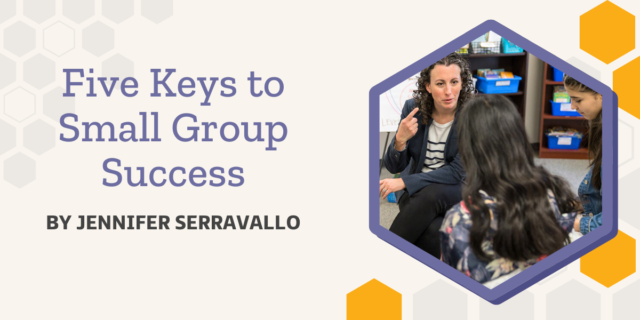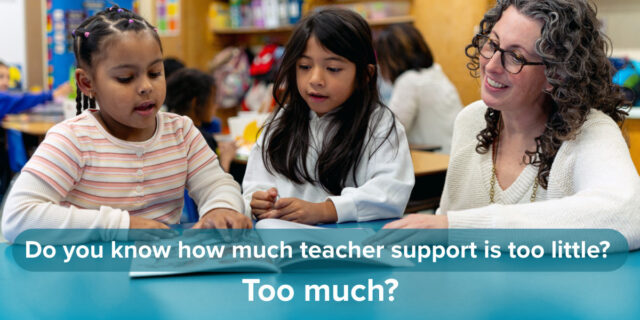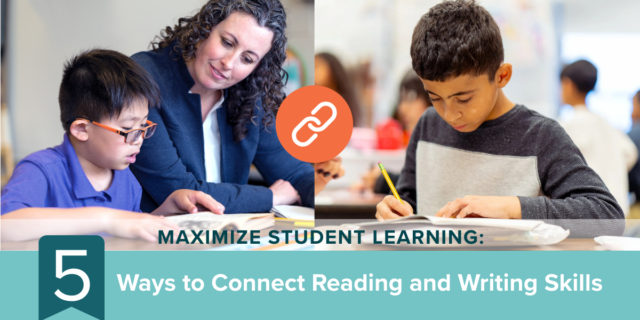
Welcome to the Heinemann Professional Development Professional Learning Community (PLC) series. Each month, we'll share a post designed to provoke thinking and discussion through a simple framework, incorporating mini-collections of linked content.
Use these as learning modules during your professional development time, whether in a team, a PLC, or on your own!
by Jaclyn Karabinas
♦♦♦♦
![]()
Connect
Sometimes a feeling of a goal being overwhelming can set in even when your belief in it is strong. Can you think of a time when you believed in something so much but the path to get there seemed unclear or unattainable?
Consider
Keep this Guiding Question in mind as you work through the steps in this month’s post: How can we achieve the goals of increased book access, time spent reading, and time spent writing about reading, by naming and confronting barriers one step at a time?
![]()
Educate
Holding a belief that children need access to lots of high-quality texts that they can read can leave teachers, once inspired, paralyzed at the thought of finding funds to build an adequate classroom library or time to collaborate with librarians to make increased book access a reality. Sometimes, we are even met with resistance that this is a priority, placing us in conflict with someone else’s belief that reading and writing about texts that matter to us is not at the top of the list.
In the article, Every Child, Every Day, Richard L. Allington and Rachael E. Gabriel make the case for six research-based elements that should be central to our decision making about what is important for reading instruction. As you read this, pay attention to where you feel tension for the rationale they present, as well as the places where you find yourself nodding in agreement.
![]()
Reflect
Take a look back over the six elements.
- Which are already integrated into the day for your students? Is this universal to the school or only in some classrooms?
- How has it been made possible? In other words, what aren’t you doing to make room for this practice?
- Which elements pose barriers? Can you name them?
![]()
Practice
Take the list of the barriers you named; see if you can piece together the steps it would take to break them down (or work around them) and reach the goal of including these elements into the day for students. Ask yourself:
- What can be let go in the materials budget to make room for your goals? What creative paths can you research to acquire books or funds?
- How might the structure of a class period, a unit, or curriculum shift to reprioritize for these elements?
- What professional learning might you need to effectively teach literacy while integrating these practices?
![]()
Extend
One of the most overwhelming ideas can be an overhaul of classroom libraries. Read this excerpt (click) by Clare Landrigan and Tammy Mulligan from their book It's All About the Books: How to Create Bookrooms and Classroom Libraries That Inspire Readers. In it, they provide one small first step to making your classroom library more appealing to students.
![]()
Refine
One of the barriers you might have mentioned in your list is the fear of ensuring comprehension when you haven’t read all of the books students now have access to read. The choice is: limit what students are reading so you know the books they are reading well, OR learn the features and characteristics of books at various levels so you know what to ask and know what to listen for in student responses. In this video blog, Jennifer Serravallo explains how this can help the feeling of panic when students are reading books you have never read.
![]()
Act
The most effective way to tackle a problem is with colleagues who share your strong beliefs! Don’t try to tackle this on your own, even if it means you collaborate by social media with others who share the interest but aren’t at your school. If we strive to make connections with others who share our beliefs, it becomes much easier to ground our decision making in these beliefs, collectively breaking down barriers in the name of children.
♦♦♦♦
Looking for more PD?
Online: We have a number of upcoming three-part webinar series with authors such as Kristine Mraz and Christine Hertz, Tanny McGregor, and more! Take a look.
Off-Site: There are still some spots left in a few of our workshops this season with authors such as Cornelius Minor, Lester Laminack and Katie Kelly, and more! Check out the schedule and see who is coming your way!
On-Site: Heinemann’s Speakers & Consulting Authors are thought leaders in how to create successful classroom and school environments based on respect, collaboration, empathy, and positivity.


